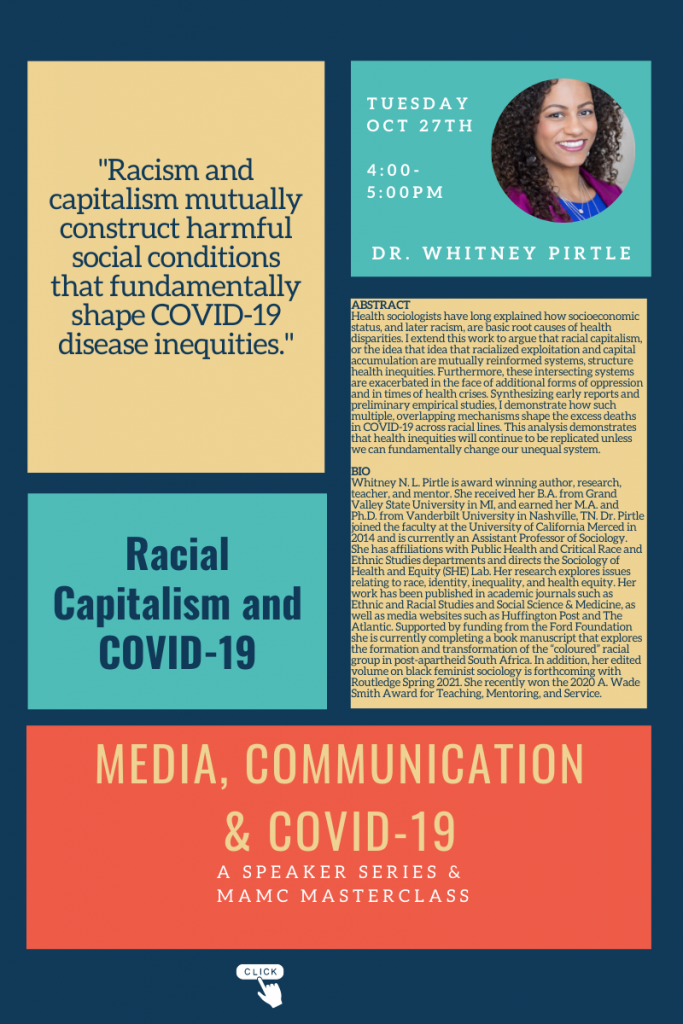We are delighted to host Dr. Whitney Pirtle whose ground-breaking work on health inequalities and COVID-19 has helped set the agenda for debate and discussion on the impacts of the pandemic on BAME communities.
TUESDAY OCT 27th 4:00-5:00PM
Register to join us on eventbrite
Health sociologists have long explained how socioeconomic status, and later racism, are basic root causes of health disparities. Dr. Pirtle extends this work to argue that racial capitalism, or the idea that idea that racialized exploitation and capital accumulation are mutually reinformed systems, structure health inequities. Furthermore, these intersecting systems are exacerbated in the face of additional forms of oppression and in times of health crises. Synthesizing early reports and preliminary empirical studies, In this presentation, Dr. Pirtle will demonstrate how such multiple, overlapping mechanisms shape the excess deaths in COVID-19 across racial lines. This analysis demonstrates that health inequities will continue to be replicated unless we can fundamentally change our unequal system.
Whitney N. L. Pirtle is award winning author, research, teacher, and mentor. She received her B.A. from Grand Valley State University in MI, and earned her M.A. and Ph.D. from Vanderbilt University in Nashville, TN. Dr. Pirtle joined the faculty at the University of California Merced in 2014 and is currently an Assistant Professor of Sociology. She has affiliations with Public Health and Critical Race and Ethnic Studies departments and directs the Sociology of Health and Equity (SHE) Lab. Her research explores issues relating to race, identity, inequality, and health equity. Her work has been published in academic journals such as Ethnic and Racial Studies and Social Science & Medicine, as well as media websites such as Huffington Post and The Atlantic. Supported by funding from the Ford Foundation she is currently completing a book manuscript that explores the formation and transformation of the “coloured” racial group in post-apartheid South Africa. In addition, her edited volume on black feminist sociology is forthcoming with Routledge Spring 2021. She recently won the 2020 A. Wade Smith Award for Teaching, Mentoring, and Service.
 Guest talk by Prof. Marina L. Gavrilova from University of Calgary on Biometric Recognition to be held Wednesday 26th of July at 14:30PM in CREATE LT, Fusion Building.
Guest talk by Prof. Marina L. Gavrilova from University of Calgary on Biometric Recognition to be held Wednesday 26th of July at 14:30PM in CREATE LT, Fusion Building.










 New Nepal scoping review on maternal & neonatal health
New Nepal scoping review on maternal & neonatal health Fourth INRC Symposium: From Clinical Applications to Neuro-Inspired Computation
Fourth INRC Symposium: From Clinical Applications to Neuro-Inspired Computation Writing policy briefs
Writing policy briefs Upholding Excellence: The Concordat to Support Research Integrity
Upholding Excellence: The Concordat to Support Research Integrity ECR Funding Open Call: Research Culture & Community Grant – Application Deadline Friday 12 December
ECR Funding Open Call: Research Culture & Community Grant – Application Deadline Friday 12 December MSCA Postdoctoral Fellowships 2025 Call
MSCA Postdoctoral Fellowships 2025 Call ERC Advanced Grant 2025 Webinar
ERC Advanced Grant 2025 Webinar Horizon Europe Work Programme 2025 Published
Horizon Europe Work Programme 2025 Published Horizon Europe 2025 Work Programme pre-Published
Horizon Europe 2025 Work Programme pre-Published Update on UKRO services
Update on UKRO services European research project exploring use of ‘virtual twins’ to better manage metabolic associated fatty liver disease
European research project exploring use of ‘virtual twins’ to better manage metabolic associated fatty liver disease